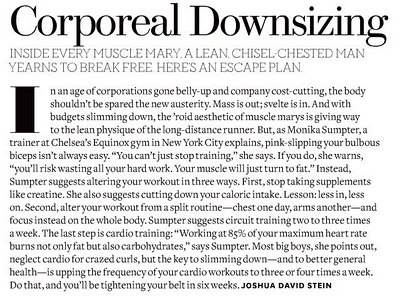Actually, yes, you can.
 The amount of time one rests between sets is an often missed, or often underestimated training variable. It’s also one of the least studied variables when it comes to looking at hypertrophy as the outcome (as opposed to strength, or other performance variables, or even biochemical markers). So it is a treat to see a study where hypertrophy is the variable of interest, and where measurement of hypertrophy is truly a direct measurement. While not every investigator can measure hypertrophy in this way, it does go to show that “It can’t be done,” or “It will never get done,” are just words, because these researchers, in the words of the famous Dos Remedios, “did work.”
The amount of time one rests between sets is an often missed, or often underestimated training variable. It’s also one of the least studied variables when it comes to looking at hypertrophy as the outcome (as opposed to strength, or other performance variables, or even biochemical markers). So it is a treat to see a study where hypertrophy is the variable of interest, and where measurement of hypertrophy is truly a direct measurement. While not every investigator can measure hypertrophy in this way, it does go to show that “It can’t be done,” or “It will never get done,” are just words, because these researchers, in the words of the famous Dos Remedios, “did work.”
de Souza TP, Fleck SJ, Simao R, et al. Comparison between constant and decreasing rest intervals: Influence on maximal strength and hypertrophy. Journal of Strength and Conditioning Research 24(7) 1843-1850, 2010. Read More...
An open letter to OUT magazine
 Dear OUT Magazine,
Dear OUT Magazine,
In reference to Joshua Stein’s “Corporeal Downsizing” article (May 2010), the misinformation in such a short paragraph was overwhelming. However, briefly: 1) It is physically impossible for muscle to turn into fat. People may accumulate fat if their daily caloric needs go down while their caloric intake stays the same, but muscle cells do not transform into fat cells even with disuse. They simply get smaller. 2) While circuit training and whole-body workouts are in vogue currently, what determines muscle growth has more to do with consistent increases in workload than it does with which muscles a person uses on which day. You can, in fact, build muscle on a circuit program. And 3) The calories a person burns with “cardio” is quite negligible; you can achieve the same weight-loss effect by reducing your calorie intake. It is misinformation such as that in your article that perpetuates long-disproven fitness myths and propagates ongoing ignorance about effective methods for weight (or muscle) loss. A magazine of your calibre should have higher standards for its sources. Read More...
Belief shouldn’t be part of why something works (unless it’s curing cancer)
There are a lot of things you should believe in: the resilience of the human spirit, your own resolve to achieve what you want to get out of life, and perhaps that we will be able to sort ourselves out ultimately without destroying ourselves in the process as a species.
But supplements, diets and workout programs shouldn’t be things that require your belief. Read More...